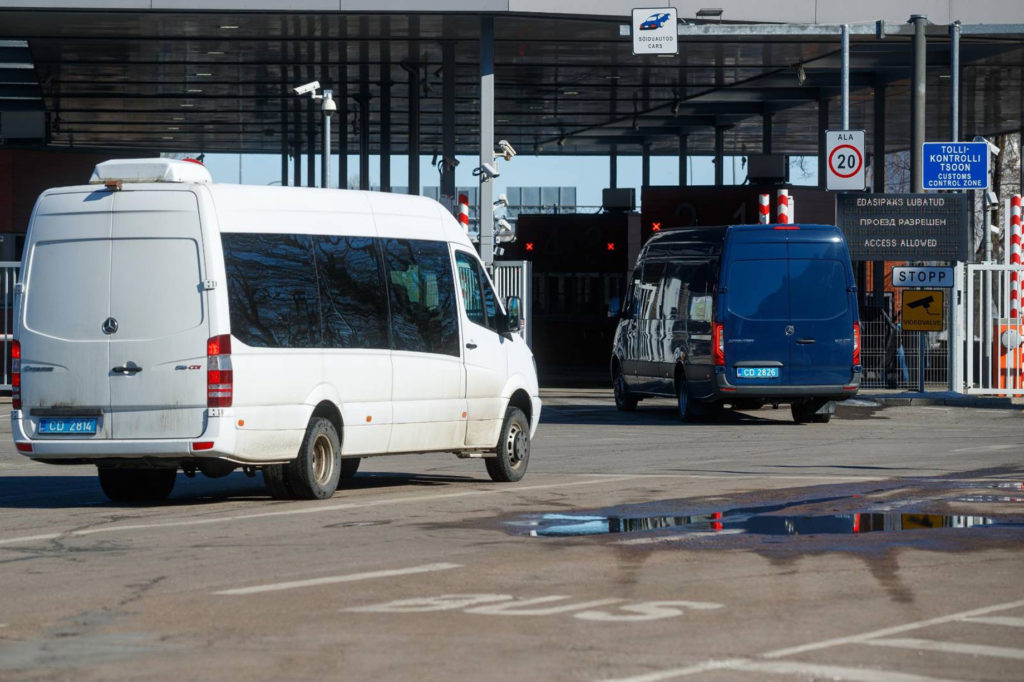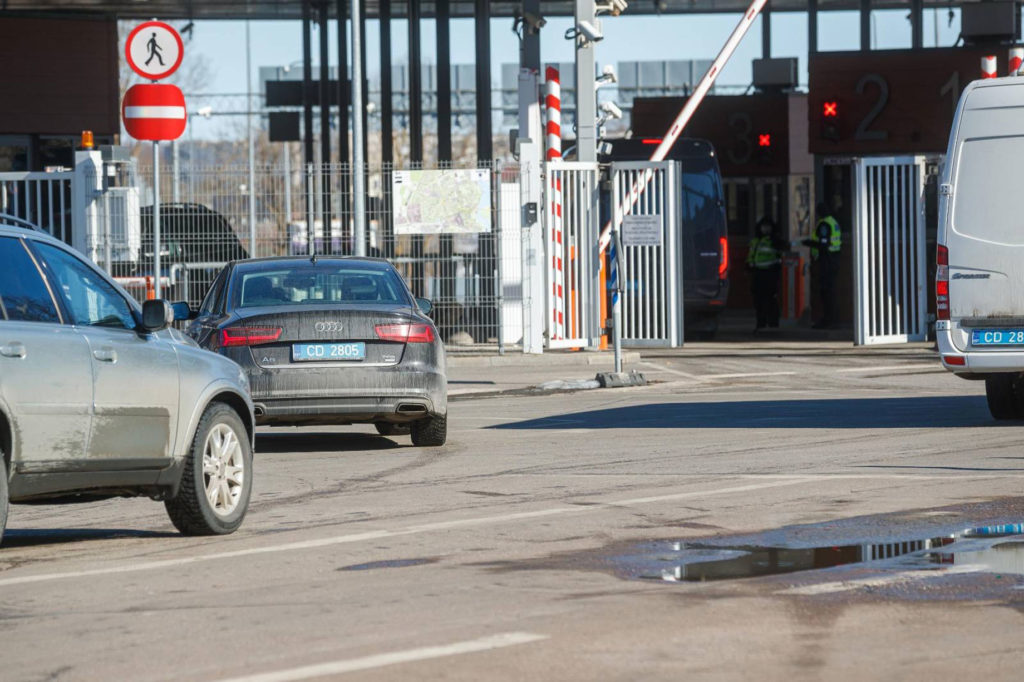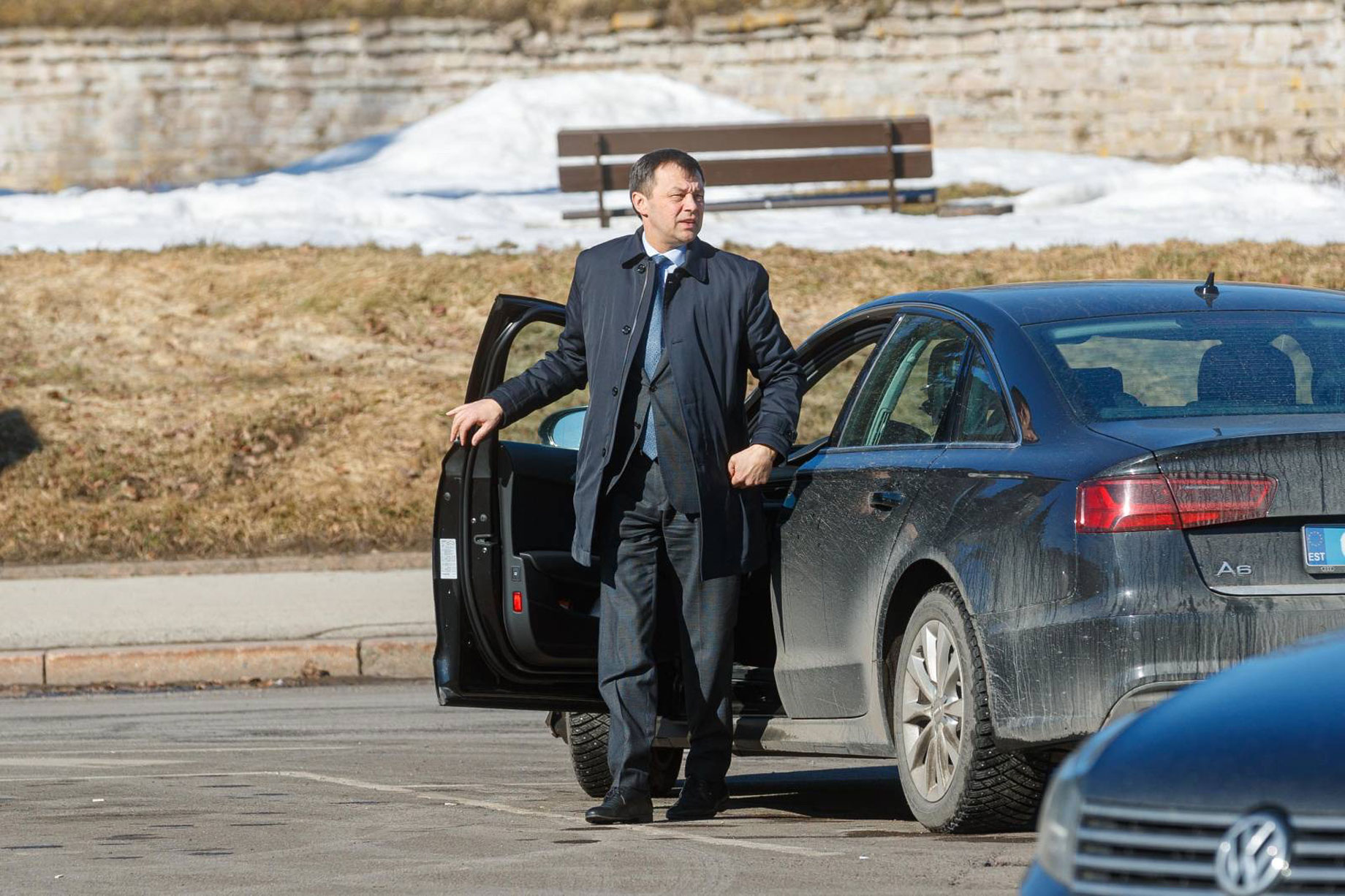On March 21, an Audi A6 sedan with a blue diplomatic license plate traveled to the Narva border crossing between Estonia and Russia. Alexander Mamayev, consul of the Russian Federation in Narva, stepped out. He was there to wave off three colleagues whom the Estonian Ministry of Foreign Affairs had declared persona non grata and given 72 hours to leave the country. It was part of Estonia’s response to show solidarity with Ukraine.
Their names have not been publicly revealed, but New Lines, in cooperation with investigative partner Delfi Estonia, can reveal that one of the three diplomats was Sergey Nalobin. As Russia did not have an accredited ambassador in Tallinn at that time, Nalobin — who holds the diplomatic rank of a minister-counselor — was the chargé d’affaires at the time of the expulsion.
The deportation of Nalobin was confirmed off the record by two different sources. And according to open-source data, attachés Anton Kovalenko and Nikita Petrov also lost their diplomatic credentials.
The Ministry of Foreign Affairs emphasized — without identifying any of the three diplomats — that all three were “directly and actively engaged in undermining Estonia’s security and disseminating propaganda justifying Russia’s military action [against Ukraine].”
Nalobin’s personal background and previous activities as a diplomat were, to put it mildly, colorful, raising questions about why he received diplomatic credentials from Tallinn in the first place.


A 2012 joint investigation by The Guardian and The Insider, an independent Russian news outlet that was recently forced to close as part of the Russian government’s ongoing crackdown on the media, found that Nalobin has family ties to the FSB, Russia’s Federal Security Service, and that while serving as a diplomat in London, he was instructed by Moscow to cultivate ties with the British Conservative Party.
The Conservative Friends of Russia, a now-defunct pro-Kremlin parliamentary group launched in 2012 at the Russian Embassy at the invitation of Nalobin, was the vehicle through which these links were forged. The objective, according to Luke Harding, a co-author of the investigation, was to “to see off motions [Russia] regards as hostile.”
Among the guests at the launch party were Matthew Elliott, former head of the pro-Brexit movement Vote Leave; John Whittingdale, a member of Parliament and honorary vice president of the group; and Carrie Symonds, who at the time worked in Whittingdale’s office and is now married to British Prime Minister Boris Johnson. In fact, even Johnson socialized with Nalobin. In a Twitter post, since deleted, that included a photo of Johnson and Nalobin posing together, Nalobin described Johnson, then mayor of London, as “our good friend.”
All of these figures went on to play prominent roles in Brexit, which culminated in Britain’s voting to leave the EU in 2016.
Political blogger Paul Staines, who later wrote about his exposure to Nalobin in The Spectator, said that he immediately suspected Nalobin was a Russian spy and that he was very surprised to see him at a private Tory party in 2014 where outsiders were not invited.
Nalobin’s ties to the FSB caused controversy for the Conservative Friends of Russia. (The group later rebranded as the Westminster Russia Forum, and on March 9, the forum disbanded following Russia’s invasion of Ukraine.) His father, Nikolai, was a KGB general, while his brother Viktor also worked for the FSB until at least 2013. After the collapse of the Soviet Union, Nikolai worked at the FSB as the deputy head of the economic counterintelligence service. Among other responsibilities, he was the supervisor to Alexander Litvinenko, the former FSB agent who fled to the U.K. in 2000 and worked for the British intelligence services before he was poisoned with the highly radioactive substance polonium-210 in London in 2006.
The U.K. government published the findings of its inquiry into the murder of Litvinenko in 2016 and concluded that the FSB operation was “probably approved” by Putin.
There is no direct proof that Nalobin is a spy, but his proximity to Russian security services raises red flags.
The diplomat, characterized by many as very communicative and active on social media, did not reply to requests for comment.
According to the Dossier Center, Nalobin, born in 1979, received his education in international law from the elite MGIMO University (Moscow State Institute of International Relations). He worked for a security company and law firm before joining the Russian Foreign Ministry in 2000. In his diplomatic career, there are no “gaps” in his timeline that would be characteristic of intelligence officers.
In the end, the British forced Nalobin to leave London. He was not officially declared a persona non grata or blacklisted. Rather his permission to stay was suddenly revoked by the Home Office in 2015. Nalobin’s service continued in the headquarters of Russia’s Foreign Ministry in Moscow, where, for example, he headed the Department of Digital Diplomacy Development. According to one source, Nalobin fell out with Maria Zakharova, the notorious spokesperson for the Russian Foreign Ministry. This quarrel was said to be the reason Nalobin landed in Tallinn in September 2019.
An individual in Estonia who is familiar with how Nalobin operates called him extremely active. “He was not like the average Russian diplomat who does not come out of the embassy and who speaks only the official talking points of the Russian Foreign Ministry.”
According to this person, Nalobin interacted with many people in Tallinn and tried to dig his way into high society — just as he did in London.
Marko Mihkelson, chair of the Foreign Affairs Committee of the Estonian Parliament, said that he did not often come into personal contact with Nalobin, but he noticed Nalobin’s activity, primarily on social media. “He loved to tag me to all kinds of Russian propaganda articles that he posted,” Mihkelson said.
Nalobin did not respond on social media to questions posed by Estonian news site Delfi. However, the Russian Embassy in Tallinn emailed one of the authors and stated that the Estonian Foreign Ministry’s accusations that the expelled diplomats had been undermining Estonia’s security were “absurd and ridiculous.”
Mihkel Tamm, director general of public relations for the Estonian Ministry of Foreign Affairs, said that Nalobin’s background was familiar to the ministry before he was granted diplomatic accreditation. “The non-issuance of visas to foreign diplomats is rather a very exceptional measure, which is always carefully considered by the host country,” he said, adding that the host country expects incoming diplomats to adhere to diplomatic procedures and practices.
“It must always be borne in mind that in the event of a visa being refused, it can be assumed that there may be a countermeasure.”
On April 4, the ministry announced that it was shutting down Russia’s consulate-general in the border town Narva and a consular office in the town of Tartu. As a result, 14 employees, including seven diplomats, will be sent across the Narva River to Russia. This includes Alexander Mamayev, who only two weeks ago waved off Nalobin.




